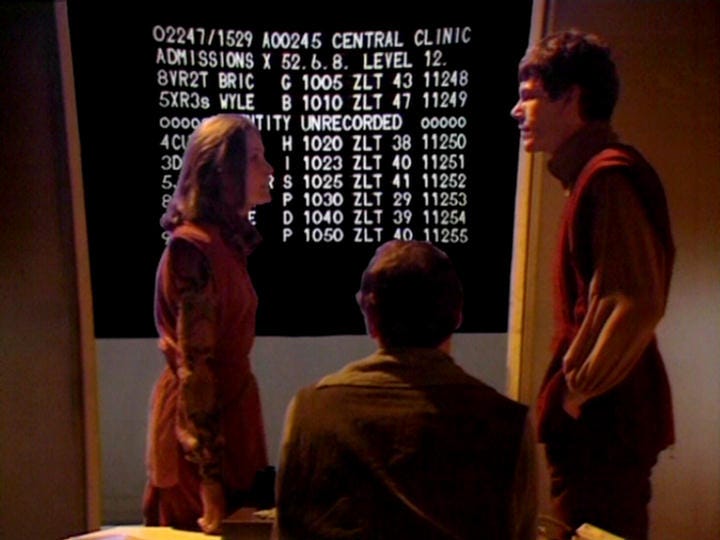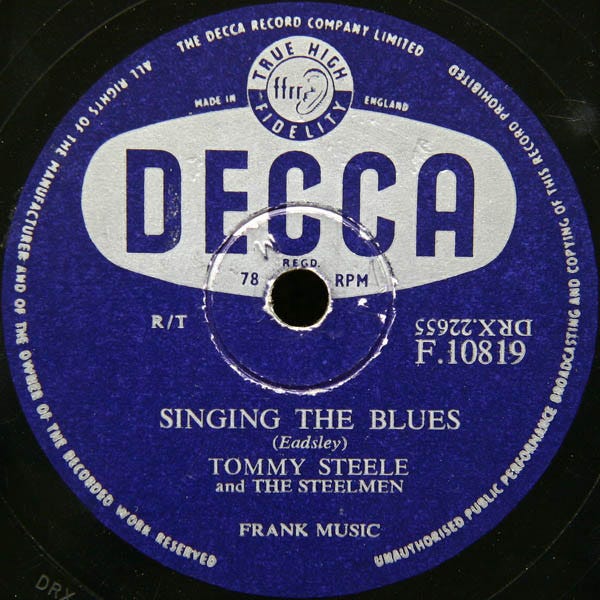How far ahead is all this?
Well. It’s the future. I think we can all agree on that.
(This apparently came as a shock to Michael Gough when he walked on to the set of ‘Volcano’ - ‘oh it’s a sci-fi, this, is it, I didn’t realise’ he announced to the astonished regular cast, who wondered what on Obsidian he could’ve made of the read-through. Maybe he thought this tale of a rationalist cult with robot servitors sitting atop a magmatic spiracle containing a nuclear bomb was set just outside Leeds. This level of inattention maybe explains his somewhat absent, Biden-esque performance.)
In ‘Bounty’ we get Blake’s 7’s first proper look into history, ie our present, via Ex-President Sarkoff’s fetish for antiques, the ‘echoes of a more civilised age’.
The series is very coy about exactly when it is set. This is unusual in a sci-fi TV show or film, where the date is often a big part of the sell. Star Trek and Babylon 5 are both set in the 23rd century, 1999 and 2001 speak for themselves, and many Doctor Who stories make a point of ironic or grand-sounding dates like the year 4000 or 5000. In Blake’s 7, we know only that it’s the third century of the New Calendar, with no further hints about when the Old Calendar, presumably the one that tells us that today is May the 18th 2025, was abolished. Nobody even mentions how far into the third century we are. Blake will tell Gan in passing in Series B that the Federation had all places of religious assembly destroyed at the start of the New Calendar.
This changing of the calendar to a presumably more ‘rational’ system seems to coincide with what we hear of the Federation beginning its expansion ‘two hundred years ago’, after the time of the United Planets. And it’s an obvious reference to the 18th century revolutionary calendar - calendrier republican français, and that’s your actual French - which was designed as part of the project to expunge all religious and royalist aspects from Gallic culture. (See also Pol Pot’s Year Zero.) This had ten days in a week, three weeks in a month, and the months were renamed - so today, for example, is Day 8 of the third week of the month of Floréal in the revolutionary year 236. Whaddya know - we’re living in the third century of the new calendar, right now!
(By the way - I’ve wracked my brains to catch all the references to history and dates in the series, but I’m sure I’ve missed something, so do write in if you spot a gap.)
Day, month and year seem to mean the same things in Blake’s time as ours, which is convenient for storytelling reasons, despite the differences that there must be in these durations on other planets. But there is no attempt made - as there are attempts made with units of speed or distance - to standardise dates, or a system for dates. The massacre at Zircaster occurred at ‘date code Beta 2: 0-0-1’; the Federation survey of Michael Gough’s planet near Headingley occurred a ‘long time ago’ at 3-0-3.
It’s very unclear, but it seems that someone took a little trouble drawing up the briefly glimpsed files that the Varons access in ‘The Way Back’. The birth dates of Blake’s ‘victims’ seem to be 42.1.5, 43.6.2, and 43.2.1, while the data record of hospital admissions on a particular recent day are headed 52.6.8. If the first number of these dates is the year, the reverse of our system, this makes the children named about ten or eleven. So we might, if pushed, say that we start off in Year 52 of the third century. (Obviously nobody in the production ever intended this to be studied in detail or at all, or anticipated anybody mad enough even to try it, forty-six years later. HIYA!)
The mention of the ‘ninth’ as a date in ‘Assassin’, for necessary story reasons, clangs amusingly, precisely because any previous reference to dates has been obscure or highly ‘futuristic’. The series normally goes out of its way never to use our idioms and customs. The ninth of what, one wonders - Spacetember? (Anachronisms - from gherkins to pickle barrels to afternoon tea - will get their own special entry one day, don’t fear.)
Bigger historical periods are referred to in very general terms. Blake’s anecdote about plague blankets in ‘Killer’ is ‘pre-Space Age’, the old wall could be ‘pre-atomic’, the module on Kairos is ‘proto-Space Age’.
This all suggests to me that we’re quite far into the future, by which I mean several thousand years ahead.
‘Bounty’ backs me up here. Sarkoff thinks his very strange folly with silver brick interiors is a ‘replica of a typical residence’ of the twentieth century. This is very fun and cute, yes, but it tells us a lot.
‘This is the finest private collection of twentieth century Earth objects anywhere in the galaxy,’ Sarkoff boasts to Blake. ‘Even on Earth itself you would find no collection like it.’ So, if we take him at his word, then - outside whatever archives or museums that the Federation runs - this small room full of junk is all that remains of our world and our culture. Anywhere.
This is it. A Tommy Steele record (current Discogs price 78p) and a Kathleen Ferrier one (£1.28). Some cutlery and a microscope and an ashtray. Several of the items - the heraldic shields and the muskets - aren’t even from the twentieth century at all.
Terry Nation was here recycling a favourite joke with the records, as 25th century Dr Who assistant Vicki, back in 1965, ‘didn’t know the Beatles played classical music’. Next week, Cally will be listening to jazz on the Series A ‘Walkman’ as she kills time by the teleport.
This is all of a piece with the series’ attitude to our present/their past - one of Jenna’s rings has a setting of an American coin, and there is a rusted revolver on Cygnus Alpha. Gan doesn’t even know the word church. In this episode Blake and Cally have no idea what Sarkoff’s car is. (Which is stretching it a bit, as they must have seen wheeled ground vehicles before - there’s one that drives right by Blake in ‘The Way Back’.) Dayna will later describe ‘the bow, the arrow and the spear’ as ‘the ancient weapons’ - but ‘ancient’ is the very same word used by Vila to describe Hell’s Angels.
We hear, very occasionally, bits of concrete history. There is Blake’s knowledge of Lord Jeffrey Ashley and quoting of Mark Twain, Egrorian quoting Mme Roland, Jarvik the Duke of Wellington. These seem like little fragments - maybe one book of quotations and anecdotes survived, like the handmade copy of the Palatine Anthology of Ancient Greek epigrams that survived, by the strangest fluke, to be rediscovered in the 1600s. Many of the big literary names of the ancient world are totally lost.
Star Trek always takes pains to quote intervening history and culture, things that will happen between our time and theirs. Blake’s 7 never does that. (There’s a cut line attempting this in the script for ‘Kairos’ which sounds like utter madness, as if they’re referring to something from a previous episode that we’ve missed.)
So. Our world feels a long time ago, and mostly long-lost. The enormous change in people’s names suggests that too. What happened to our world, our nations and cultures, if this is all that’s left of us? It’s quite poignant, really, or it would be if it was dwelt on. Tellingly, Sarkoff dwelling on it is portrayed as a very annoying pose.
The nice thing about this very distant setting is that we are spared the cutesy likes of Star Trek-style space Irishmen, or whatever. (Though we get Space Arabs in this very episode, more on whom next time.)
Our world seems to the people of Blake’s 7 much like the ancient world is to us. It is a jumble, even to Sarkoff - the same way we think of antiquity as one big wodge of events that were actually centuries apart. Homer, after all, was as historically distant to Caesar Augustus as Chaucer is to us, but to our thinking the Trojan Horse and I, Claudius happened the same week. In the far future the Venerable Bede, Shakespeare, Dickens and JK Rowling will likely all be concertinaed together, merged in a stack. People will picture Mrs Thatcher and King Alfred as being of the same era.
So, how far ahead then?
Keep reading with a 7-day free trial
Subscribe to The Culture Bunker to keep reading this post and get 7 days of free access to the full post archives.






